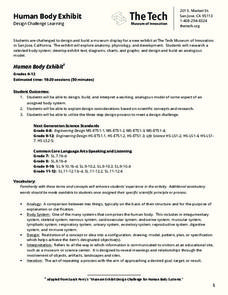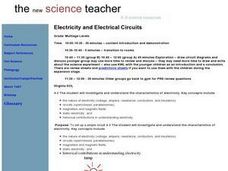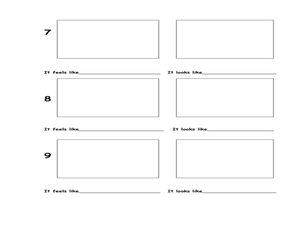Tech Museum of Innovation
Human Body Exhibit
Explore human anatomy and physiology using models. Scholars study systems of the human body and design a display for a museum exhibit. To complete the activity, individuals create analogous models of their chosen human body systems.
Chicago Botanic Garden
Recognizing Change (Observation vs. Inference)
What is the difference between making inferences and making observations? Young climatologists refer to a PowerPoint to make observations on each slide. They record their observations in a provided worksheet before drawing a...
Curated OER
Evaporation Inquiry
The evaporation of water and what happens to it as it travels through the water cycle are the focuses of this lesson. The evaporation of water seems like a "magical" process to people of all ages. This lesson takes away the mystery, and...
Curated OER
Connect the Spheres: Earth Systems Interactions
Is everything really connected? Take your class on a walk outside, where they will make observations and write them down on a worksheet. Once they are back in the classroom, learners will work to determine if and how things like birds,...
Polar Trec
Sea Ice Impact
The arctic seas contain currents that are both warm (with high salinity) and cold (relatively fresh water) that circulate throughout the year. Through discussion, a lab, and a web quest, participants explore the impacts of melting and...
Cornell University
Optical Simulation of a Transmission Electron Microscope
Don't have an electron microscope? Have your classes build the next best thing! A hands-on lesson asks scholars to build a model of Transmission Electron Microscope (TEM). They then use their models to identify the function of each...
Curated OER
Macromolecule Lab
During a macromolecule lab, young chemists perform multiple tests, including iodine starch tests, to determine if eight mystery foods contain lipids, sugars, or starches.
Curated OER
Simplicity of Electricity
Students examine how to make an electrical circuit. They listen to a teacher led discussion, design a switch to control a circuit, and construct a signaling device.
Curated OER
Electricity and Electrical Circuits
Students are introduced to electricity and electrical circuits. In groups, they draw circuit diagrams, complete a KWL chart and discover the difference between open, closed and series circuits. They define new vocabulary and make...
Curated OER
The Wonderful World of Slugs
Examine a slug? Of course, what else would a 2nd grader do with it? Pupils use clues and go on a slug hunt, read a slug story, or make a cooperative group mural of a slug's habitat. While older learners catalog slugs, go on a slug hunt,...
Curated OER
Identifying Birds
Eighth graders identify and name birds in their school yard by comparing and contrasting pictures of 12 common birds in the Phoenix metro area using the Ecology Explorers Protocol. They formulate questions based on observations that lead...
Curated OER
Spuds in Space
Students explore the effects of velocity on an object when it collides with another object. They design and outfit a potato astronaut in a spacesuit to withstand the hazards of high velocity impacts from space debris and meteoroids.
Learning to Give
Start Cleaning the Air
Advocate for the environment! With the short story included, learners are prompted to think about radon (the odorless and colorless gas) and possible ways to get donations or raise money to purchase detection equipment. The plan spans...
Curated OER
Sound
First graders investigate sound and recognize the importance of hearing. They listen to and identify sounds in the environment, classroom, and on a pre-recorded tape. The students classify each type of sound and participate in a Sound...
Curated OER
Touchy Feely
Students investigate the sense of touch. In this senses lesson, students use their sense of touch to predict what objects are inside of a bag by feeling them with their eyes closed.
Curated OER
Green Leaves
Third graders, after having conducted one experiment three times, record their observations results in a chart. They predict what hidden colors they believe that a leaf holds. Students record their predictions in their science note books...
Curated OER
Local Environmental Issues: Pollution
Third graders discuss the ways in which human interaction with the environment and production of waste products contribute to pollution. Through a pollution demonstration, they explain how various groups of plants and animals can be...
Curated OER
Water Quality and Temperature
Students evaluate the effects of temperature changes on the metabolic rate of a clam. Conclusion questions are addressed which help students to process and articulate their experiences.
Curated OER
Yogurt Production
Learners work together to complete an experiment making yogurt. They test different temperatures and different amount of ingredients. They record and analyze their data.
Curated OER
Exploring Marine Objects
Learners identify the sources of water on Earth. In this life science lesson, students list the different plants and animals that live in the ocean. They explore marine objects in the lab and draw them.
Curated OER
Preventing Lead Poisoning in Children
Students examine the problem of children being poisoned by lead in the United States. After discussing the uses of lead, they brainstorm a list of ways they can be poisoned by the substance. In groups, they discover how they can stay...
Curated OER
Water Conservation
Students identify ways to conserve water. In this environmental lesson, students use a water use checklist to identify how much water they use in one day. Students analyze the data and brainstorm ways to conserve water.
Curated OER
Rotocopters
Young scholars construct their own rotocopters to study flight. For this flight lesson students work in groups and complete timed trials of their rotocopters.
Curated OER
Exploring Alternative Energy Sources
Students research the amount and kinds of energy that are produced and consumed in the United States, including the limitations of this kind of consumption. They research and create a display to teach classmates about a specific...

























